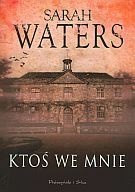Take a photo of a barcode or cover
Update: Finished, still feel like it was strong in some ways but the third part was way too long and I really stopped caring. I feel like this book could be at least 100 pages shorter, to be honest. Its a shame because the second part was really strong and I still feel the same about the aspects I note below.
---
So far, I am pretty captivated by this one, but more for academic rather than emotional reasons. I think this novel is really good. It reminds me of Virginia Woolf, with all the walking, female flaneur passages. My main interests here are
1) Space. Waters uses spatial relations to reflect or amplify different social relations. At first I was kind of bored with the descriptions of such-and-such cleaning task, of the house. But as the novel progresses its easy to see how the house is a metaphor for a certain type of domesticity. There are certain queer thresholds, like the stairway, the foyer, the garden, the bathroom - all areas that are either liminal or abject in some way; these spaces are where queer potential or tension happens.
2) Queer affect. I basically think this novel should be read as a companion to Sara Ahmed's book Queer Phenomenology. There are so many poignant passages where nothing much is happening except a certain kind of "moment" or connection that, in my mind, illustrates what Ahmed is talking about when she discusses queer orientations. These moments are amazing and help to subvert the more standard melodrama of the surface plot.
3) Neat gendered juxtapositions, and their subversion. The best example I can think of is the night that Len is attacked, and comes in bleeding. He is marked by violence throughout, becoming the symbol of a fractured masculinity that is referenced throughout (i.e. post-war masculinity in the process of redefinition, class blurring, inability to provide materially leading to unrest). But Len's attack occurs in the same day that the first kiss happens. So there is, at first, a pretty typical masculine = violence, feminine = love dichtomy going on, but this is also frequently challenged (or queered).
Looking forward to reading the rest.
---
So far, I am pretty captivated by this one, but more for academic rather than emotional reasons. I think this novel is really good. It reminds me of Virginia Woolf, with all the walking, female flaneur passages. My main interests here are
1) Space. Waters uses spatial relations to reflect or amplify different social relations. At first I was kind of bored with the descriptions of such-and-such cleaning task, of the house. But as the novel progresses its easy to see how the house is a metaphor for a certain type of domesticity. There are certain queer thresholds, like the stairway, the foyer, the garden, the bathroom - all areas that are either liminal or abject in some way; these spaces are where queer potential or tension happens.
2) Queer affect. I basically think this novel should be read as a companion to Sara Ahmed's book Queer Phenomenology. There are so many poignant passages where nothing much is happening except a certain kind of "moment" or connection that, in my mind, illustrates what Ahmed is talking about when she discusses queer orientations. These moments are amazing and help to subvert the more standard melodrama of the surface plot.
3) Neat gendered juxtapositions, and their subversion. The best example I can think of is the night that Len is attacked, and comes in bleeding. He is marked by violence throughout, becoming the symbol of a fractured masculinity that is referenced throughout (i.e. post-war masculinity in the process of redefinition, class blurring, inability to provide materially leading to unrest). But Len's attack occurs in the same day that the first kiss happens. So there is, at first, a pretty typical masculine = violence, feminine = love dichtomy going on, but this is also frequently challenged (or queered).
Looking forward to reading the rest.
Yawn. I kept waiting for something interesting to happen. It took me three weeks to struggle through 160 pages. Not worth the trouble.
dark
emotional
reflective
tense
slow-paced
Plot or Character Driven:
A mix
Strong character development:
Complicated
Loveable characters:
Complicated
Diverse cast of characters:
No
dark
emotional
informative
reflective
sad
tense
medium-paced
I put this book on my to-read list so long ago that I'd completely forgotten what the book was about, or why I had added it in the first place. The beginning reminded me of a sort of Downton Abbey-type daughter and her mother trying to make the best of their deteriorating wealth, then begrudgingly taking in lodgers as a last resort before having to work like common women themselves. The new lodgers are a married couple, the Barbers, both younger than the main character (the daughter of the house), Frances. As time goes on, Frances becomes familiar with the couple, and on an off chance, she befriends Mrs. Lilian Barber.
The first part of the book surprised me because, for once, my first impression had actually been correct; there were quite a few scenes where Frances lingered a little too long on her new friend, and I thought that she might be a lesbian. Surprise, surprise! Not only do we find this out quite early on in the book, when Frances admits it to Lilian, but then they become lovers (complete with some steamy scenes)! It was at about this point - the end of part one - that I began to lose a bit of credulity for the historical part of this historical fiction. The book feels placed into a certain time in the past, but somehow, the heart of what I was reading felt modern - nearly too modern.
The second part is where the book earns its "gothic" adjective, as described on the inside of the book's jacket. I certainly wasn't expecting that, either.
The third part mostly had me wondering "will they, won't they."
I will say I appreciate that neither one of the lovers died, as the lesbian/gay characters dying trope seems to pop up in a lot of popular fiction, and I find it annoying. Yes, Frances and Lilian escape the punishment for their deed, but we do see that they've lost a lot of their wide-eyed gaiety about the world as a result. A sympathetic reader would hope, then, that they can rebuild a better future together, living honestly with themselves and each other, as it seems this is where the two may well be heading.
My final thoughts: this book reminded me of a blend of Downton Abbey and Chicago (the musical). So if you enjoyed those series and think that 1920s London is an interesting setting for a book - and you like long books that linger, which I agree with other reviewers that this book did often do - then you will likely enjoy it, perhaps very much. It was very readable, but I don't feel I got much out of it - I found it very difficult to like any of the characters, even the lovers. By part three, I honestly didn't care if they gave themselves up to the court or not, and wouldn't have been surprised if Frances had jumped off the bridge, either.
The first part of the book surprised me because, for once, my first impression had actually been correct; there were quite a few scenes where Frances lingered a little too long on her new friend, and I thought that she might be a lesbian. Surprise, surprise! Not only do we find this out quite early on in the book, when Frances admits it to Lilian, but then they become lovers (complete with some steamy scenes)! It was at about this point - the end of part one - that I began to lose a bit of credulity for the historical part of this historical fiction. The book feels placed into a certain time in the past, but somehow, the heart of what I was reading felt modern - nearly too modern.
The second part is where the book earns its "gothic" adjective, as described on the inside of the book's jacket. I certainly wasn't expecting that, either.
The third part mostly had me wondering "will they, won't they."
I will say I appreciate that neither one of the lovers died, as the lesbian/gay characters dying trope seems to pop up in a lot of popular fiction, and I find it annoying. Yes, Frances and Lilian escape the punishment for their deed, but we do see that they've lost a lot of their wide-eyed gaiety about the world as a result. A sympathetic reader would hope, then, that they can rebuild a better future together, living honestly with themselves and each other, as it seems this is where the two may well be heading.
My final thoughts: this book reminded me of a blend of Downton Abbey and Chicago (the musical). So if you enjoyed those series and think that 1920s London is an interesting setting for a book - and you like long books that linger, which I agree with other reviewers that this book did often do - then you will likely enjoy it, perhaps very much. It was very readable, but I don't feel I got much out of it - I found it very difficult to like any of the characters, even the lovers. By part three, I honestly didn't care if they gave themselves up to the court or not, and wouldn't have been surprised if Frances had jumped off the bridge, either.
I really did like it a lot, but not so much once that murder nonsense began. It really wasn't what I signed up for.
I wanted to like this book! But I just didn't. I found it somewhat well-written, but kind of gross, and not really pleasurable to read.
emotional
tense
medium-paced
Plot or Character Driven:
A mix
Strong character development:
Yes
Loveable characters:
N/A
Diverse cast of characters:
Yes
Flaws of characters a main focus:
Yes
Graphic: Infidelity, Blood, Abortion, Murder
Moderate: Misogyny, Sexism, Sexual content
Minor: Miscarriage, Suicidal thoughts, War
probably 3.5 and a half. last 200 pages kind of dragged into nowhere.
Couldn't get my teeth into it and felt like too daunting a prospect at nearly 600 pages



